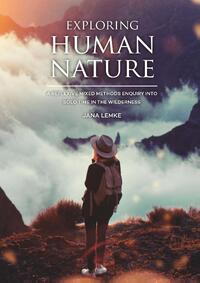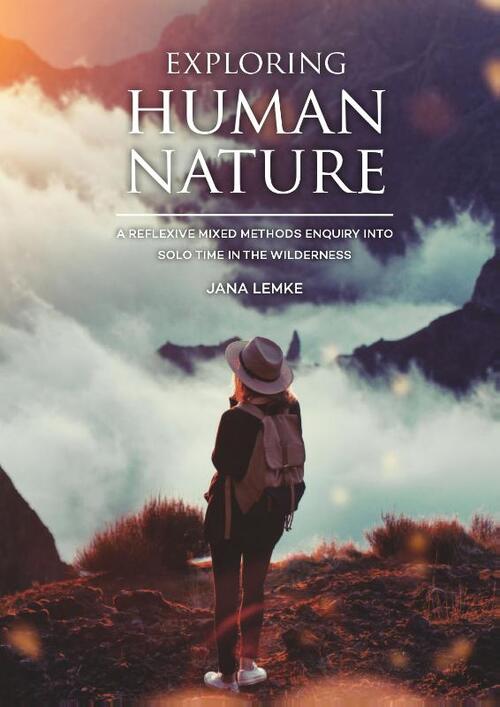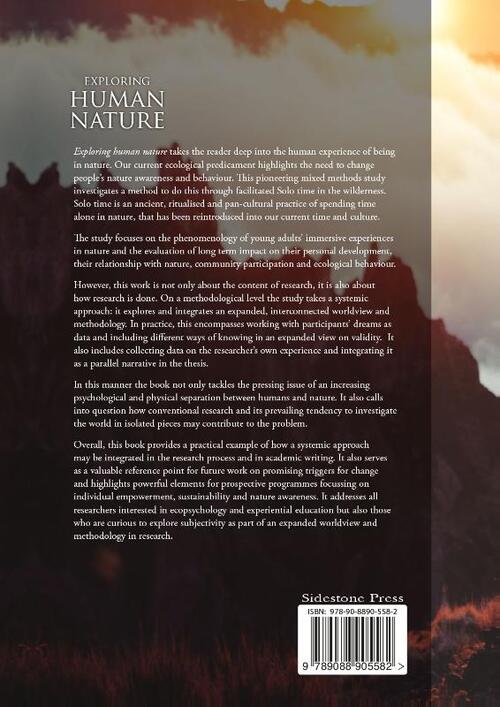95.-
Exploring human nature takes the reader deep into the human experience of being in nature. Our current ecological predicament highlights the need to change people's nature awareness and behaviour. This pioneering mixed methods study investigates a method to do this through facilitated Solo time in the wilderness. Solo time is an ancient, ritualised and pan-cultural practice of spending time alone in nature, that has been reintroduced into our current time and culture.
The study focuses on the phenomenology of young adults' immersive experiences in nature and the evaluation of long term impact on their personal development, their relationship with nature, community participation and ecological behaviour.
However, this work is not only about the content of research, it is also about how research is done. On a methodological level the study takes a systemic approach: it explores and integrates an expanded, interconnected worldview and methodology. In practice, this encompasses working with participants' dreams as data and including different ways of knowing in an expanded view on validity. It also includes collecting data on the researcher's own experience and integrating it as a parallel narrative in the thesis.
In this manner the book not only tackles the pressing issue of an increasing psychological and physical separation between humans and nature. It also calls into question how conventional research and its prevailing tendency to investigate the world in isolated pieces may contribute to the problem.
Overall, this book provides a practical example of how a systemic approach may be integrated in the research process and in academic writing. It also serves as a valuable reference point for future work on promising triggers for change and highlights powerful elements for prospective programmes focussing on individual empowerment, sustainability and nature awareness. It addresses all researchers interested in ecopsychology and experiential education but also those who are curious to explore subjectivity as part of an expanded worldview and methodology in research.
Contents:
Acknowledgements
Contents
List Of Tables
List Of Figures
1 Introduction
1.1 Current Situation And Problem Statement
1.2 Outlook For The Present Work
1.3 Self-Reflective Preface
2 The Human-Nature Relationship Through The Lens Of Contemporary Science
2.1 The Emotional And Social Dimension Of Human Care For Nature
2.1.1 The Influence Of Emotions
2.1.2 Coping Mechanisms And The Role Of Hope
2.1.3 The Human Disposition To Imitate
2.1.4 The Influence Of Social Norms
2.1.5 Environmental Identity And The Social Environment
2.2 The Relational And Experiential Dimension Of Human Care For Nature
2.2.1 Environmental Identity And The Experience Of Nature
2.2.2 Nature Connectedness
2.2.3 Formative Experiences In The Course Of Life
2.2.4 Transcendence And The Human Experience Of Nature
3 The Human-Nature Relationship Through The Lens Of An Expanded Worldview
3.1 A Brief History Of The Human-Nature Relationship
3.2 Expanding The Contemporary Worldview
3.2.1 A Critical Examination Of The Contemporary Worldview
3.2.2 A Brief Introduction To Deep Ecology
3.3 An Ancient Practice Revisited - Solos In Nature
3.3.1 Introduction
3.3.2 The Structure Of The Solo As A Rite Of Passage
3.3.3 Research Findings
3.3.3.1 Framework Of The Solo
3.3.3.2 The Experience Of Solitude
3.3.3.3 Life Significance Of A Solo Experience
4 Mixed Methods Enquiry Of Immersive Experiences In Wild Nature
4.1 Overarching Aims And Objectives
4.2 Extracted Hypotheses And Research Questions
4.2.1 Quantitative Research Questions A...
The study focuses on the phenomenology of young adults' immersive experiences in nature and the evaluation of long term impact on their personal development, their relationship with nature, community participation and ecological behaviour.
However, this work is not only about the content of research, it is also about how research is done. On a methodological level the study takes a systemic approach: it explores and integrates an expanded, interconnected worldview and methodology. In practice, this encompasses working with participants' dreams as data and including different ways of knowing in an expanded view on validity. It also includes collecting data on the researcher's own experience and integrating it as a parallel narrative in the thesis.
In this manner the book not only tackles the pressing issue of an increasing psychological and physical separation between humans and nature. It also calls into question how conventional research and its prevailing tendency to investigate the world in isolated pieces may contribute to the problem.
Overall, this book provides a practical example of how a systemic approach may be integrated in the research process and in academic writing. It also serves as a valuable reference point for future work on promising triggers for change and highlights powerful elements for prospective programmes focussing on individual empowerment, sustainability and nature awareness. It addresses all researchers interested in ecopsychology and experiential education but also those who are curious to explore subjectivity as part of an expanded worldview and methodology in research.
Contents:
Acknowledgements
Contents
List Of Tables
List Of Figures
1 Introduction
1.1 Current Situation And Problem Statement
1.2 Outlook For The Present Work
1.3 Self-Reflective Preface
2 The Human-Nature Relationship Through The Lens Of Contemporary Science
2.1 The Emotional And Social Dimension Of Human Care For Nature
2.1.1 The Influence Of Emotions
2.1.2 Coping Mechanisms And The Role Of Hope
2.1.3 The Human Disposition To Imitate
2.1.4 The Influence Of Social Norms
2.1.5 Environmental Identity And The Social Environment
2.2 The Relational And Experiential Dimension Of Human Care For Nature
2.2.1 Environmental Identity And The Experience Of Nature
2.2.2 Nature Connectedness
2.2.3 Formative Experiences In The Course Of Life
2.2.4 Transcendence And The Human Experience Of Nature
3 The Human-Nature Relationship Through The Lens Of An Expanded Worldview
3.1 A Brief History Of The Human-Nature Relationship
3.2 Expanding The Contemporary Worldview
3.2.1 A Critical Examination Of The Contemporary Worldview
3.2.2 A Brief Introduction To Deep Ecology
3.3 An Ancient Practice Revisited - Solos In Nature
3.3.1 Introduction
3.3.2 The Structure Of The Solo As A Rite Of Passage
3.3.3 Research Findings
3.3.3.1 Framework Of The Solo
3.3.3.2 The Experience Of Solitude
3.3.3.3 Life Significance Of A Solo Experience
4 Mixed Methods Enquiry Of Immersive Experiences In Wild Nature
4.1 Overarching Aims And Objectives
4.2 Extracted Hypotheses And Research Questions
4.2.1 Quantitative Research Questions A...

- : Jana Lemke
- : Sidestone Press Dissertations
- : 9789088905599
- : Engels
- : Hardcover
- : 280
- : april 2018
- : 945
- : 264 x 190 x 20 mm.

